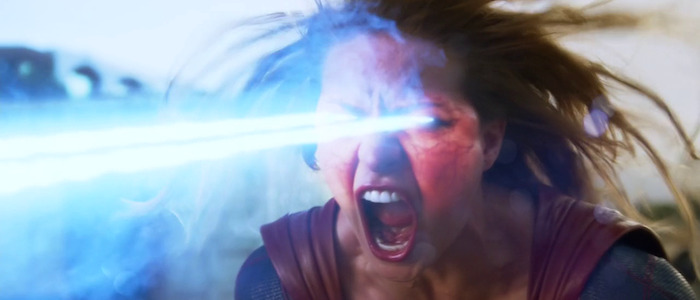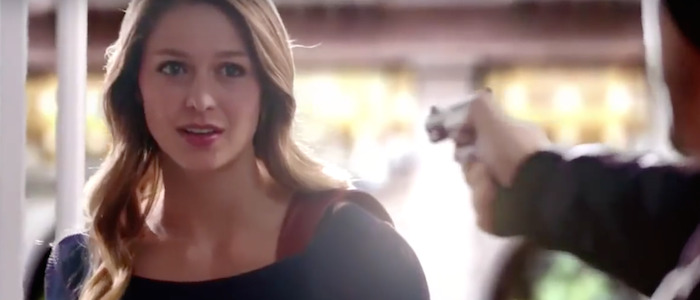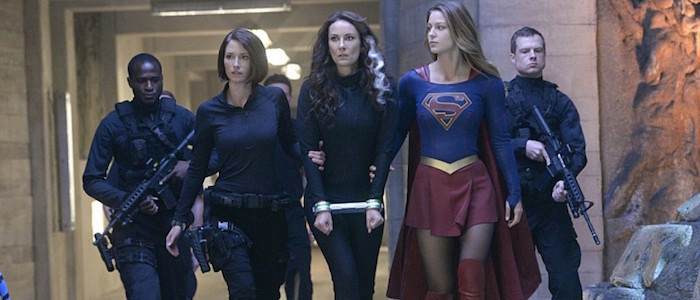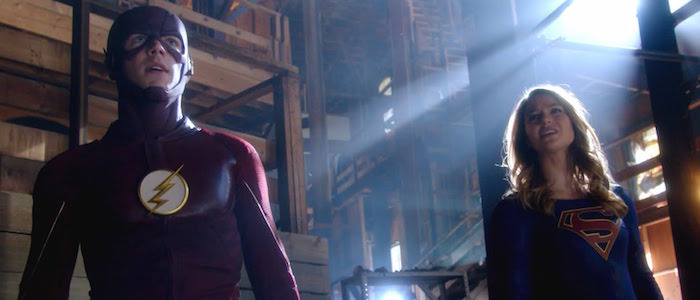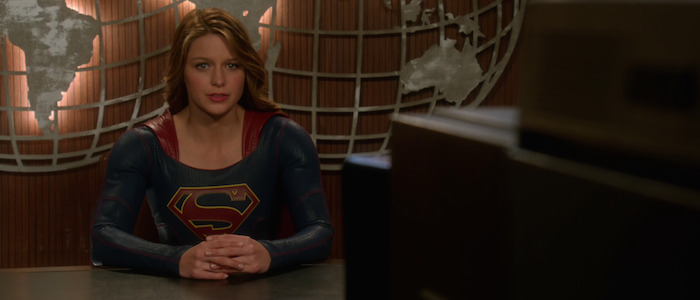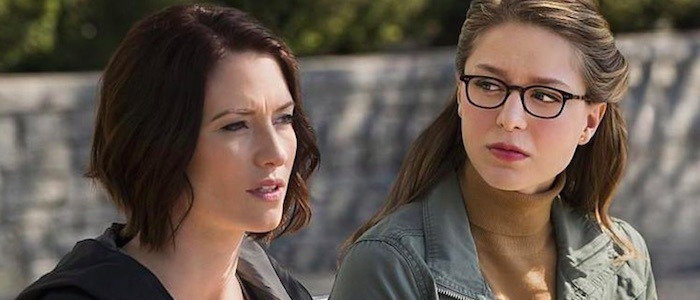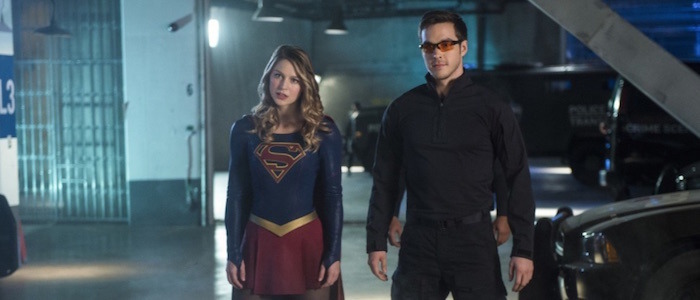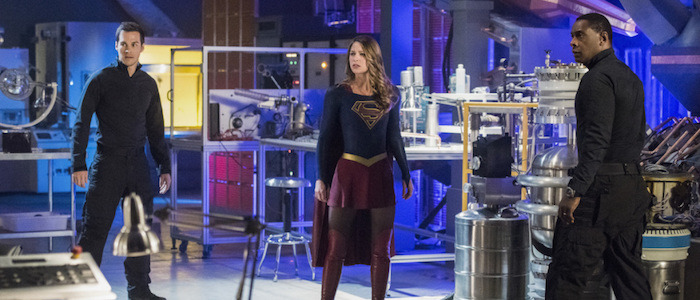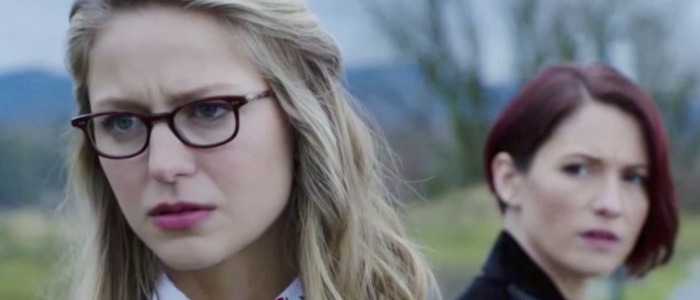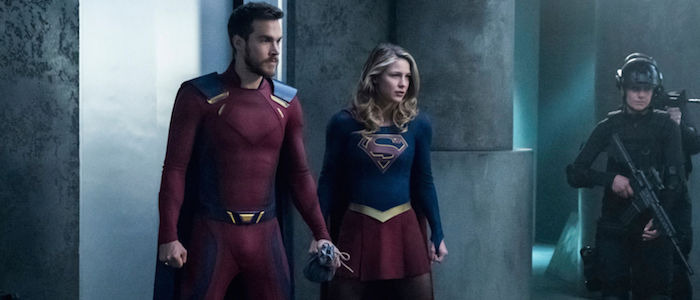The 10 Best Episodes Of 'Supergirl'
Few live-action superhero stories capture the Golden Age spirit of these characters as they were originally intended. Supergirl, which began on CBS before joining The Flash, Arrow and Legends of Tomorrow over at Y.A-hub The CW, kicks off its fourth season on October 14, and we figured now might be a good time for a recap. (You can read our rundown of the best Flash episodes here). Sent to Earth to look after her cousin Kal-El just as her planet was destroyed, Kara Zor-El, AKA Kara Danvers, arrived after a trip through a wormhole, by which time her cousin had already grown up and donned the Superman mantle. Like her comicbook counterpart, Supergirl has always existed in the Man of Steel's shadow, but with DC's film universe opting to take a darker approach to Clark Kent, it was up to Supergirl to pick up the slack and fill the void with a sense of hope.
While it meanders from time to time (just as any 20-plus episode network show with a quick turnaround would), Supergirl still manages to use its stellar cast of characters, led by Melissa Benoist (Glee) to tell some of the most thoughtful superhero stories of the modern era. With an ever-evolving supporting cast, including Kara's sister Alex (Chyler Leigh), a government agent with a tender coming-out arc and David Harewood as DC staple J'onn J'onzz/Martian Manhunter, the show manages to keep both socially conscious subtext (and, occasionally, actual text) in its crosshairs. So, without further ado, here are ten episodes you should probably catch up on.
1. S01E06 “Red Faced”
Supergirl wears its politics on its sleeve, so despite its less-than-perfect looking Red Tornado — reduced her to a government drone — it manages to tackle gendered hypocrisy in ways that are both touching and incisive. Despite the sunny disposition of both the show and its protagonist, Supergirl is unafraid to dive in to the messier parts of its premise (the kind superhero movies may not have time for), in the form of the day-to-day anger and alienation faced by Kara Danvers.
As an extra-terrestrial forced to assimilate into human society (an immigrant metaphor if there ever was one), Kara experiences constant isolation, which, if not properly dealt with, can turn swiftly into anger. The problem with someone like Kara getting angry however (as opposed to her cousin Clark) is that she's a woman in the male-dominated field of journalism. As her boss Cat Grant (Calista Flockhart) puts it, women aren't allowed to be angry in the workplace — at least not in the same way as men. Since Kara is on the lookout for new outlets for her aggression, turning Red Tornado into a puppet of General Lane ("Fight my robot!") makes sense, allowing her a release valve that causes harm to no living thing. Other than Kara herself, that is; the episode not only ties the concept of the superhero secret identity to socialized womanhood, from the putting on of a pristine public face to the relatively higher consequences of screwing up, but it also ties Kara's powers to her ability to keep her cool. Simply existing is a high-wire act for a woman in the spotlight, and pushing herself to do so despite all the anger renders Supergirl powerless by the episode's end. Which brings us to...
2. S01E07 “Human for a Day”
One of the best ways to examine a superhero is to see who they are without their powers. It worked for Spider-Man 2, and it certainly works for "Human for a Day," in which the Girl of Steel has to reckon with being robbed of the thing she holds most dear: her ability to save people. Letting someone die is the most devastating defeat she can imagine, so when such an event comes to pass amidst a giant Earthquake, Supergirl has to act fast in order to re-affirm her heroism (to herself, if no one else).
De-powered and finally vulnerable to bullets, she stands in the way of a gunman and his potential victims regardless, because it's the right thing to do. What's more, her appeal to the gunman's humanity — and her sheer belief in the best in him — diffuses the situation, in a scene befitting of the iconic 'S.' (The episode also reveals Martian Manhunter for the first time, which made me jump up on my couch out of sheer joy when I saw it.)
3. S01E10 “Childish Things”
Dysfunctional parent-child relationships show up a lot in Supergirl, and Kara's friend Winn Schott (Jeremy Jordan) is the right kind of character to focus on in a tale of serial killer daddy issues. Winn spends much of the first season playing the woe-is-me, "friendzoned" pal, and what's scariest about him is the occasional hints of aggression and duplicitousness in his behaviour. Though let it not go unsaid, one of the central tenets of the show's feminism is tackling masculinity in ways that benefit men; "Childish Things" is a major turning point for Winn because it allows him to confront the darker parts of himself.
The "we're not so different, you and I" villain speech has an entirely different ring to it when coming from The Toyman, because he's delivering it to his son. Winn fears his father's rage and violence, not only because of what it does to others, but because it might reside in him too. However Kara, ever the optimist, chooses to the see the best parts of Winn, casting the duo's friendship in a new light. If Supergirl is the ideal, leading humanity towards the light, Winn is the everyman, stumbling behind her as he tries to join her in the sun. He's all of us, dealing with our demons while struggling to be better.
4. S01E18 “Worlds Finest”
A crossover episode born out of sheer fan desire — keep in mind, The Flash and Supergirl were on different networks at this point — it almost doesn't matter that it follows The Flash's villain-of-the-week formula. Barry Allen and Kara Danvers in the same room is the most delightful thing.
Take for instance Barry explaining the Multiverse to Winn and James Olsen (Winn just accepts it after all he's seen), or Barry learning that Kara is an alien (he's seen enough to accept it too), or Barry running out to get everyone ice cream in a split second just to demonstrate his speed. It's all so, so wonderful to watch, because these heroes are so full of love and joy despite the darkness they deal with.
5. S01E20 “Better Angels”
As the first season comes to a close, Kara is forced to fight her family on multiple fronts. Her sister Alex has been mind-controlled and given a Kryptonite blade and battle armour — their fight even uses the visual language of Batman v Superman, as if cheekily affirming narrative superiority; this battle actually matters. Once she gets through her sister safely, Supergirl has to confront her last remaining blood relative, her mother's twin sister Astra, symbolically fighting the darkest parts of her own lineage while choosing to protect her new home, planet Earth.
Astra and her husband Non have enacted the "Myriad" project, enslaving the minds of Earth's citizens on order to subjugate them permanently. In order to counteract Myriad, Supergirl gives a public broadcast about strength and hope, which helps the people of National City free themselves from its brainwashing effects, making the literal the themes Supergirl has come to represent all season and wrapping up a stellar year of television.
6. S02E06 “Changing”
Season 2 is a fair bit rockier than the first but it has plenty of commendable high-points, chief among them being the episode where Alex realizes her sexuality (vis-à-vis her feelings for officer Maggie Sawyer) and comes out to her sister. It's a quiet scene that speaks to both the dramatic prowess of actors Leigh and Benoist, as well as the show's renewed focus on acceptance in a series about alien immigrants and refugees.
While the episode does have a major downside in the form of Supergirl's use of lethal force (in a manner that's barely contextualized), the show does in fact take corrective measures on this front later in the season.
7. S02E10 “We Can Be Heroes”
The show's ninth episode, "Supergirl Lives," follows "Changing" in its use of lethal force, though it does so with purpose. "We Can Be Heroes" plays like a direct response to the series' casual killing, redrawing the lines between villain and hero by examining lethal force, collateral damage, and the ability to forgive.
M'gann M'orzz, a reformed White Martian, reveals herself to J'onn/Martian Manhunter, the last remaining Green Martian on account of their being wiped out by the Whites (History much?), causing J'onn to wrestle with the idea of forgiveness in light of M'gann's complicity. Meanwhile the stranded Mon-El (Chris Wood), Prince of Daxam (Krypton's enemy planet), continues his training under fellow refugee Kara as the two chase down an escaped Livewire, Supergirl's arch nemesis up until this point. The best part about this episode is it pushes the show towards a greater moral complexity, forcing our heroes to confront the idea that villains can be victims too.
8. S02E20 “City of Lost Children”
Taking a page almost literally out of Alex Ross and Paul Dini's Batman: War on Crime, in which Batman comforts a young Black boy named Marcus before he uses a gun and goes down the path of violence, "City of Lost Children" recontextualizes the scene. James Olsen, now Batman-esque vigilante The Guardian, also reaches out to a young Black boy named Marcus
(a psychic alien in human form), though James being a Black man himself holds relevance. Before he unwittingly commits telekinetic violence outside his control, Marcus is finally able to see a hero like himself, which brings him back to the light.
Placing James in this context works as a meta-textual mea culpa too. Not that a show has to apologize or work doubly hard to justify casting a Black actor (if you're wondering whether people were upset at Jimmy Olsen being Black: they were), but taking a "race blind" approach to the character seemed to defeat the purpose in part, since the world of Supergirl certainly wasn't free from discrimination. In the episode, J'onn, another alien in the visage of a Black man, talks of the struggle he's had to face, while James tries to ignore his existence as a Black man in a largely white country — that is, until young Marcus begins to find strength and comfort in James, in a world that is otherwise hostile to him. (It's from this point on that Jimmy Olsen being Black starts to have more of a point, especially in contrast to the white superheroes and how they're seen by the public)
9. S03E14 “Schott Through the Heart”
While the third season meanders at first, it finds its way back on track post-hiatus in "Schott Through the Heart," in which dysfunctional parental relationships re-enter the spotlight. Winn Schott, after accepting the ways he and his father were different in season 1, must now confront the common abuse and trauma that binds him and his absentee mother (the incredible Laurie Metcalf), all while Winn's father The Toymaker plays potentially deadly pranks on them from beyond the grave.
Winn isn't the only one having to confront his father's legacy. J'onn's father M'yrnn, a rescued Martian priest, begins showing early signs of dementia, which takes with it not only M'yrnn's memories, but the kindness he passed down to his son, as the two confront their anger in dealing with the situation. Yeah, season three gets real; the episode also allows J'onn to establish why he continues to wear the face of a Black man despite the racism he faces in his human form. His reasoning? "I don't want to live in a world where I have to change the color of my face to be seen. I'd rather change the world."
10. S03E21 “Not Kansas”
As M'yrnn's dementia worsens, he and J'onn reluctantly discuss performing a sacred Martian ritual that will pass down the remaining memories from father to son. In accepting this, however, J'onn will essentially have to accept his father's impending death, a battle that no superhero can win. The best we can do in the face of death is comfort one another, which is where Supergirl proves why the family soap-opera format works for superhero shows; none of us can do it alone...
...a battle that can be won, however, is saving lives from ending prematurely. Where its cousin Arrow paid lip service to the American gun debate with some vaguely worded "both sides" solution that never actually shows up on screen, Supergirl goes all-in on law enforcement's role in gun violence, with J'onn himself deciding that the C.I.A. equivalent he leads should do away with lethal weapons as they can be misused for harm. A strong political stance nestled among a heart-wrenching character story is exactly what makes this show special.
***
Supergirl returns October 14, 2018 .

